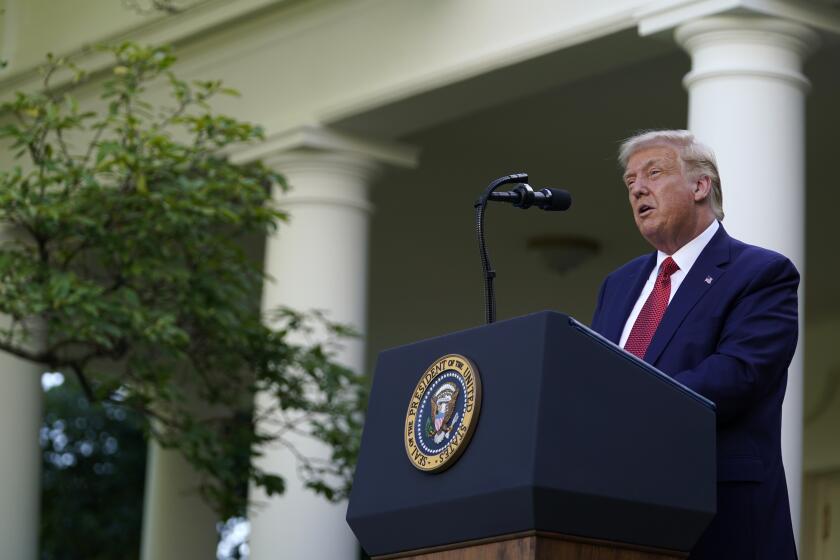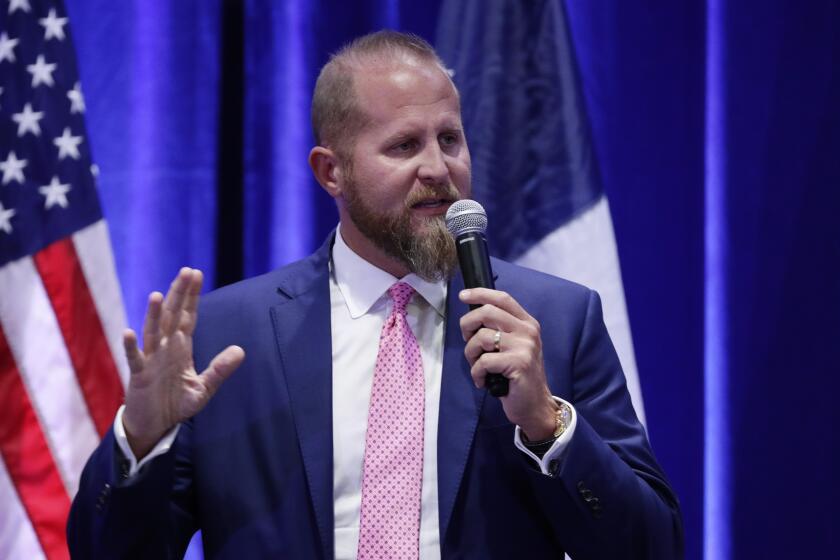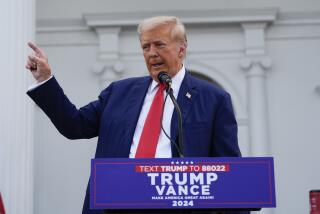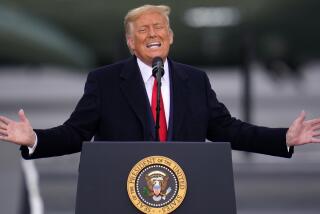Trump plans for second season of coronavirus briefings
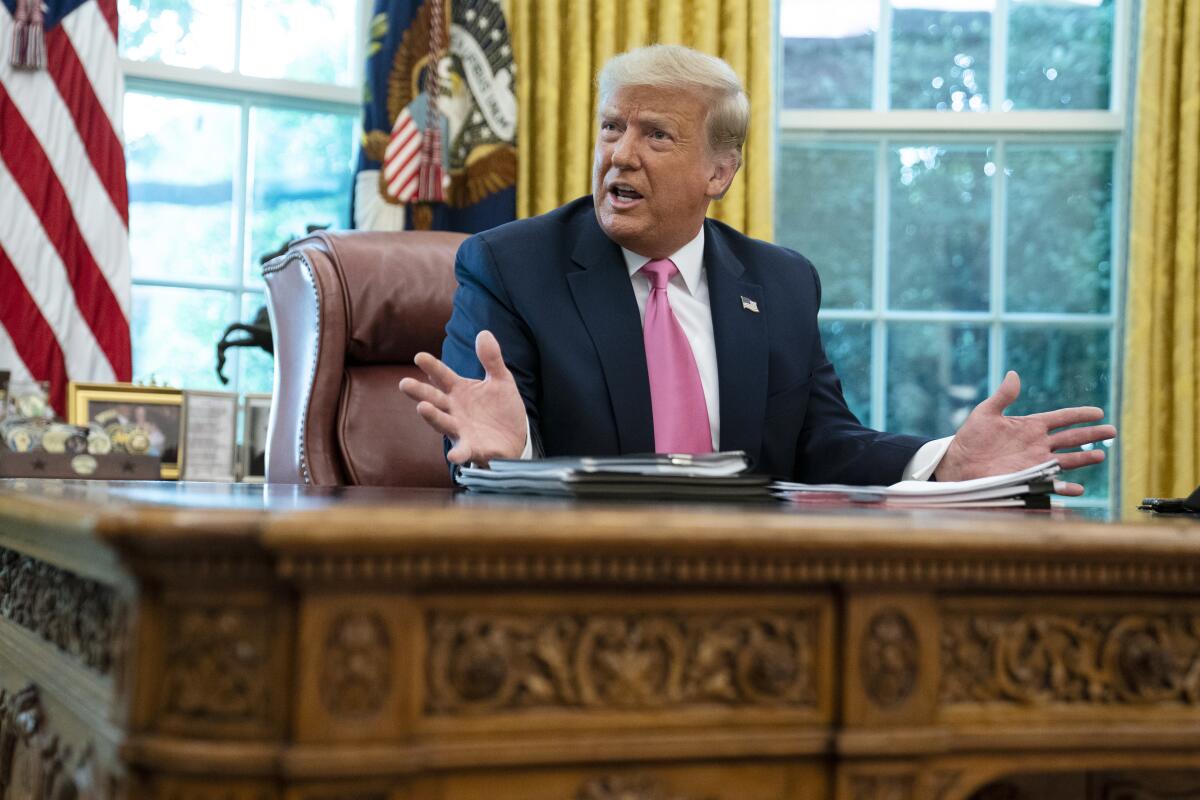
- Share via
WASHINGTON — With the country setting records for new coronavirus cases, President Trump is belatedly and begrudgingly returning the deadly pandemic to his public schedule after weeks of appearing desperate to talk about anything else.
He announced Monday that he would restart his regular briefings about the virus, probably Tuesday, three months after he stopped them following a backlash over his suggestion that injections of disinfectant could be used to kill the disease.
It’s unclear if this midsummer reboot will differ much from his performances in the spring, when he damaged his political standing and clouded attempts to control the pandemic by contradicting public health officials, railing against critics of his administration’s response to the virus and rarely showing empathy for victims.
Trump seemed to sweep away those unhappy memories Monday, instead focusing on his favored metric — audience.
“I was doing them, and we had a lot of people watching, record numbers watching in the history of cable television, and there’s never been anything like it,” Trump said during a meeting in the Oval Office.
Even when Trump has policy accomplishments to talk about, he often distracts from them with political attacks — a strategy that’s harmed his standing
Republicans have been pushing for the administration to take a more visible role in battling the pandemic, fearing that the crisis will continue unabated and lead to a Democratic sweep in the November election. Several have differed from the president in consistently urging people to wear masks and respect restrictions on public gatherings to slow the spread of the virus.
But their calls have focused on letting his administration’s experts take center stage. Instead, Trump appears ready to hog the spotlight again. He described the renewed briefings as if they were another season of “The Apprentice,” the reality television show he hosted before running for president.
“I’ll do it at 5 o’clock like we were doing,” he said. “We had a good slot. A lot of people were watching.”
The decision to start holding briefings again reflects Trump’s scramble to reverse his slide in the polls, where he’s trailing by double digits to former Vice President Joe Biden, his likely Democratic opponent.
Trump has often used official White House events as launch pads for campaign attacks on Biden, such as last week’s rambling hour-long monologue in the Rose Garden.
But voters may not respond favorably to such a spectacle when they already disapprove of Trump’s handling of the coronavirus. An ABC News/Washington Post poll released last week showed that 64% of Americans don’t trust what he says about the pandemic.
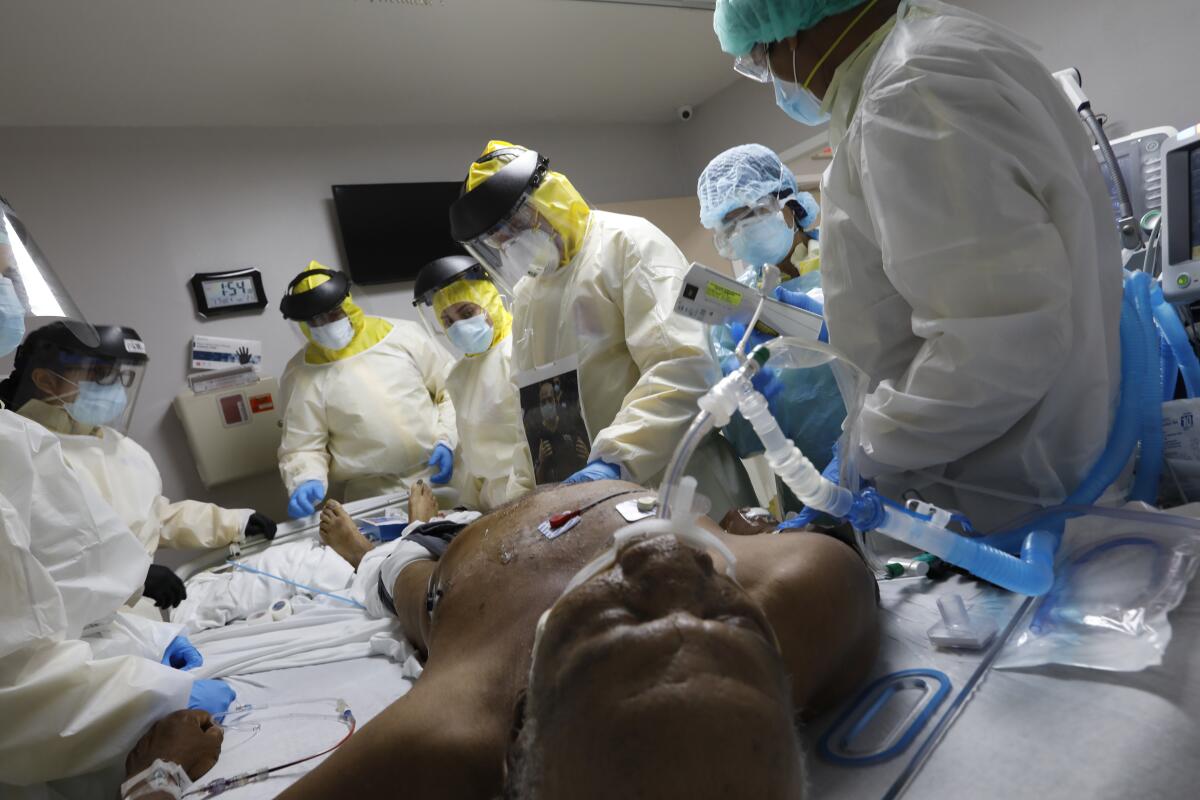
Andrew Bates, a Biden spokesman, said Trump’s announcement shows “what he cares about most is not saving American lives, but getting more attention.”
“We’ve watched this exact scene from Donald Trump’s ongoing horror movie before when he hijacked the briefings and spread dangerous misinformation,” he said.
Although the coronavirus outbreak has subsided in New York, it’s bounced back in California, and new cases have surged in Florida, Texas and Arizona. More than 140,000 Americans have died since the first deaths in February, and overall death rates nationwide have started to rise again.
Trump rarely has discussed the virus in the last two months except to brag about his administration’s response or complain that he hasn’t gotten enough credit, and he’s acknowledged the continued threat only reluctantly.
“The coronavirus, in all fairness, that’s a problem,” he conceded in a call with supporters Sunday night. He also described the challenge in the past tense, as if the worst of the crisis was over.
“We closed our country,” Trump said. “We saved millions of lives. We’re now open.”
Administration officials, speaking on the condition of anonymity, describe Trump as bored with a virus that has upended life around the country, and he’s been focused on almost everything except the pandemic.
Trump, trailing badly behind Joe Biden, fires his campaign manager, Brad Parscale — a move that’s been anticipated.
Last week, for example, he bragged about cutting government regulations while standing in front of an elaborate display of pickup trucks and posed with a stack of Goya products after the food company’s chief executive faced criticism for visiting the White House.
That strategy appears to have contributed to his plunging levels of public support.
“It’s really hard to distract people from a virus that’s killing hundreds of thousands and seems to be getting worse,” said Seth Masket, a political science professor at the University of Denver. “And it feels like this will only continue to get worse the longer he tries to talk about other things.”
Trump’s lack of focus is apparent behind the scenes as well. The president prefers to chat about campaign strategy with friends and allies, unable or unwilling to acknowledge that a more effective response to the virus would likely improve his political standing more than anything else.
One person who spoke earlier this month with Trump about the state of his reelection effort said they discussed messaging, polling and even specific campaign staffers, but the topic of the government’s handling of the pandemic never came up.
“He thinks there’s not much for him to do or say at this point,” the person said, speaking on the condition of anonymity to discuss a private conversation. “His thinking is, it’s up to the governors at this point.”
The decision to abdicate presidential leadership on a nationwide crisis has proved to be singularly disastrous.
“He’s trying to dance away from reality here,” said David Gergen, an advisor to four presidents. “There’s an old saying — never remodel your house until you’ve fixed the leak in the roof. He’s got a huge, terrible leak in the roof that’s flooding everything else.”
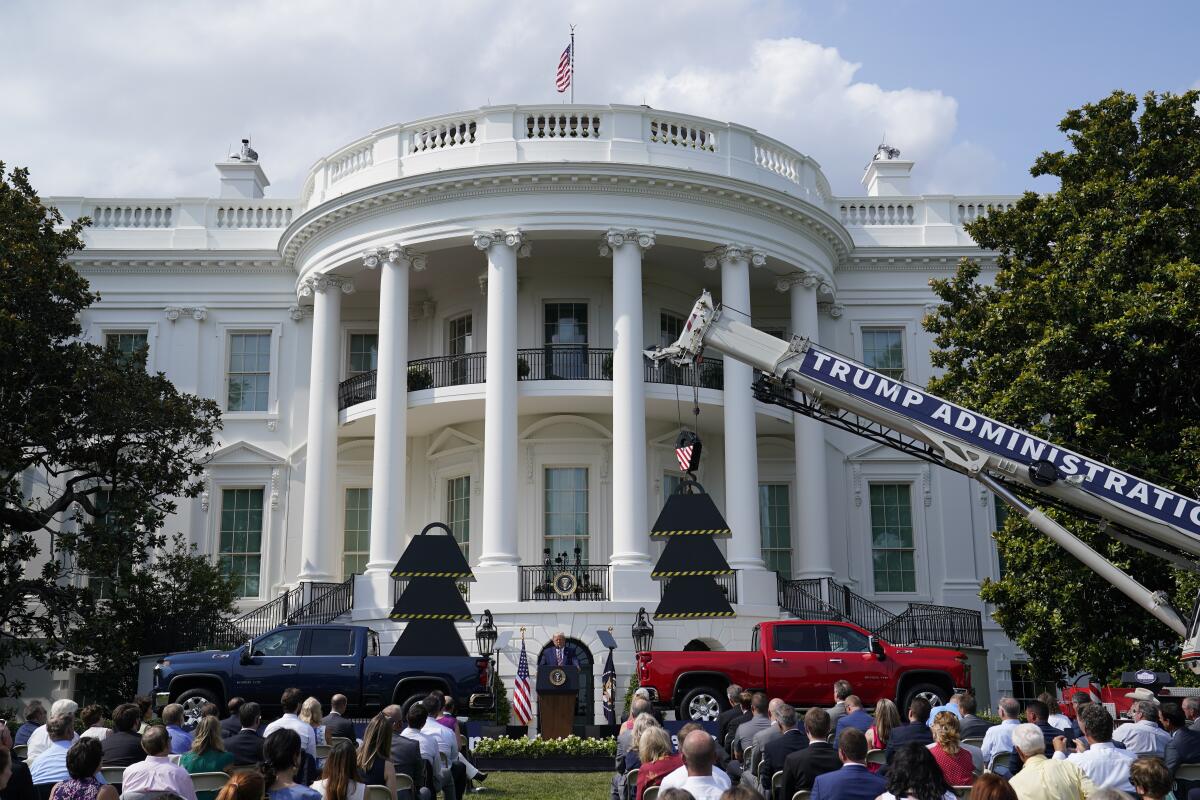
But Trump has announced no new plans for combating the virus. Instead, he’s planning to unveil policies on immigration and healthcare, the kinds of topics that might dominate a normal election year but barely register with the coronavirus spreading out of control.
“You’ll see levels of detail, and you’ll see levels of thought that a lot of people believed very strongly we didn’t have in this country,” Trump said Thursday. “We’re going to get things done. We’re going to get things done that they’ve wanted to see done for a long, long time.”
Trump has also touted his harsh response to nationwide protests sparked by the death of George Floyd while in Minneapolis police custody, dispatching federal law enforcement officials to protect statues and government buildings that have been targeted for vandalism.
Despite the backlash to the deployment of Homeland Security forces in Portland, Ore., Trump said “they’ve done a fantastic job” and he wants to send more to other cities, “all run by liberal Democrats.”
Conditions in some U.S. cities are “worse than Afghanistan,” he said Monday in the Oval Office.
David Polyansky, a Republican political consultant, said Trump has to target other topics when voters disapprove of how he’s handled the coronavirus.
“The fact of the matter is, he’s not in a position of strength to fight on that terrain,” he said. “He’s got to go to the higher ground to the issues that he can fight on.”
Polyansky noted that most polls show voters still favor Trump over Biden on economic issues, describing it as “a real opening and an opportunity.”
But the economy may not provide the political refuge that Trump wants. Not only does the unemployment rate still surpass the worst of the Great Recession, it’s unlikely that more people will be able to return to work until the virus is under control.
Trump’s campaign has focused on ominous messages about rampant crime, running advertisements saying, “you won’t be safe in Joe Biden’s America.”
“The issue of law and order is at the top of mind for many people,” said Corey Lewandowski, a senior advisor to Trump’s reelection campaign.
The coronavirus, he said, will just be one topic of many.
“I don’t think this will be the only issue as you look at the totality of the president’s record that people will be judging him on at the ballot box,” he said.
More to Read
Get the L.A. Times Politics newsletter
Deeply reported insights into legislation, politics and policy from Sacramento, Washington and beyond. In your inbox three times per week.
You may occasionally receive promotional content from the Los Angeles Times.
